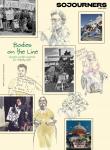WE TEND TO approach Lent passively. Some of that is appropriate. After all, we start Lent by putting ashes on our heads to symbolize our grief, and grief often makes us more still. But Lent is a season of intentional activity. To repent is to shift course. We continue to move, but in a different direction. We walk with God, following where God leads, no matter what we must leave behind.
This journey eventually leads to the cross, and later to resurrection. That’s when we find the journey has just begun. We were made to seek God, to question, to be in tension with mystery, to wrestle with God like Jacob, and to eventually find what we’re looking for. And when we come into contact with God in whatever ways are possible, we realize we cannot serve this God as one would serve an idol. We cannot operate out of empty ritual or rote adherence to any custom. We can’t appease or bribe this God. This God is not confined to our shrines, nor does God thrive off our material gifts and sacrifices. What this God wants is much more profound: repentance, trust, and a complete reorientation of one’s heart away from self and toward companionship with God. Many who’ve prepared to walk the Camino de Santiago pilgrimage did so by training on their own trails for months before making the trek. Lent similarly trains us for a lifelong journey of resilience, trust, and resistance to the forces of evil and despair.
April 3
Embracing Change
Isaiah 43:16-21; Psalm 126; Philippians 3:4-14; John 12:1-8
A GREAT IRONY of ministering in the Reformed tradition is that people rarely welcome change. It’s at best tolerated and often fully resisted. The body may process threats (real or perceived) in ways that bypass cognitive thinking and engage our survival reflexes. But change is part of life, and history shows what can happen when we don’t constructively embrace it: violent xenophobia that has followed an influx of immigrants; resistance of the majority to various civil rights movements; or an attack on the U.S. Capitol to stop Congress from certifying election results. We have a responsibility to appropriately interpret and respond to change, lest we miss the good that can accompany it.
The Deutero-Isaiah text foretells salvation for Jews in exile in Babylon. God would do a “new thing” (43:19), make a change that would return them to their ancestral land. They were urged to forget the “former things” (verse 18) and move on. Psalm 126 sees the same community rejoicing in the changes God had made, though they wrestle with the specter of what existed before and the longing to return to that. Church leaders may be very familiar with such wistfulness.
But there are also those who run toward new paradigms, who embrace change. In John’s gospel, Mary of Bethany is an example of someone going in a radically different direction for the sake of something greater. In his letter to the church at Philippi, Paul proudly claims his authority as a righteous Jew to invite these Gentiles not into Judaism but into the new thing God is doing with Jesus as the Messiah. In this messianic age, these Gentiles will worship the God of Israel in a new way, as Gentiles and not as Jews.
As Lent concludes, we consider that repentance includes an invitation toward new paths carved by the Spirit. Can feelings of threat be overruled by trust in God’s “new thing”?
April 10
Christ’s Lynching Tree
Isaiah 50:4-9; Psalm 118:1-2, 19-29; Philippians 2:5-11; Luke 19:28-40
IT WILL NEVER be lost on me, thanks largely to the work of theologian James Hal Cone, that what happened to Jesus was a lynching. The word “lynch” likely came to us during the Revolutionary War, but public torture and murder of dissidents to terrorize and extract compliance from the oppressed predates that word by centuries. Whatever your preferred atonement theory, it should be said that Jesus was killed because he threatened the status quo.
Appropriately, Deutero-Isaiah’s third servant song is included in the readings this week. The servant has tried to be faithful in his teaching and willingly put up with abuse. It’s unclear why he would go through all this except that he believes he’ll be vindicated. Vindication is also a theme in Psalm 118 and was a refrain among the crowds as Jesus entered Jerusalem for the Passover festival. His entrance was an act of protest against the occupying power, and it didn’t win friends among religious leaders who’d hoped to align with that power. An affront to the ruling authority of this magnitude could not go unanswered, and future attempts needed to be disrupted. It is this kind of direct action that lynching tries to disincentivize.
There is a righteous indignation so overwhelming that the rocks would cry out (see Luke 19:40) if we did not. At protests in U.S. streets today, one can hear chants inspired by the words of organizer and archenemy of racialized terror Ella Baker: “We who believe in freedom cannot rest!”
April 17
Our Intimate God
Isaiah 65:17-25; Psalm 114; 1 Corinthians 15:19-26; John 20:1-18
JOHN'S ACCOUNT OF the resurrection is my favorite. There is a beautiful intimacy to it. Mary Magdalene, who is not named a disciple because of her gender but very much was, came to Jesus’ tomb after he was murdered by the state. We’re not told why, but it’s presumed she came as a last act of service to her teacher. She needs to properly prepare his body for burial. He died before the start of Sabbath and there was no time between his last breath and sundown for those preparations. They had to hurriedly wrap him and place him in the tomb, but none of the other rites, rituals, and last acknowledgments of human dignity were performed. So, she came to retrieve the body, but it wasn’t there. Even when Jesus approaches her, she doesn’t initially know it’s him until he calls her by name.
Mary’s conviction to share the news of the resurrection is born out of a deeply personal encounter. As Deutero-Isaiah comes to a close, the prophet casts an eschatological vision in which God and people know each other intimately: “... while they are yet speaking, I will hear” (65:24). Psalm 114 echoes this refrain of a special bond between God and God’s people. For the church at Corinth, it was important that Paul cast a similar eschatological vision that reassured them of bodily resurrection and the promise that death itself will be defeated. The resurrection signals a closeness of God to humanity that won’t be overcome even by death. This God knows and is with us in ways more profound than we know—even when it seems defeat is imminent. For a people who need a change, whose humanity and imago dei have been denied for so long, this is good news. Alleluia!
April 24
An Easter Laugh
Acts 5:27-32; Psalm 150; Revelation 1:4-8; John 20:19-31
THE SECOND SUNDAY of Easter is celebrated by many as “Holy Humor Sunday,” which has its roots in 15th-century Bavaria. Christians celebrate Risus Paschalis (“Easter Laugh”), and priests include jokes in their sermons to make their congregations laugh as a way of celebrating the resurrection of Christ, which is understood as God’s ultimate prank on the forces of death and evil. The resurrection is God getting the last laugh, so this is a day to laugh and celebrate the sovereignty of God.
Jokes are only funny, however, if you get what they mean. If you need to explain a joke, it’s usually not funny. But, unlike other jokes, this “joke” multiplies our joy when it’s explained over and over again. This is what happens for Thomas in today’s gospel and to so many disciples after him. If you are the butt of the joke, however, as the council and high priest persecuting the disciples were, it’s no laughing matter. In John’s eschatology, even those who pierced Jesus will see his coming with the clouds. Psalm 150 is a doxology to the entire book—“Let everything that has breath praise the Lord!” (verse 6). Its vision is one of complete and pervasive acknowledgement of God’s goodness.
Historian of religion and humorist M. Conrad Hyers once said, “Humor is not the opposite of seriousness. Humor is the opposite of despair.” The punchline of Easter is that despair is dead, not us. Our Redeemer lives! Like Epiphany, the news of the resurrection unfolds slowly, sometimes painfully so. Even the disciples kept their doors locked in fear of what might come their way from those who killed their teacher. But Jesus has a way of appearing on the other side of our locked doors, dispelling our doubts and even our despair.

Got something to say about what you're reading? We value your feedback!







